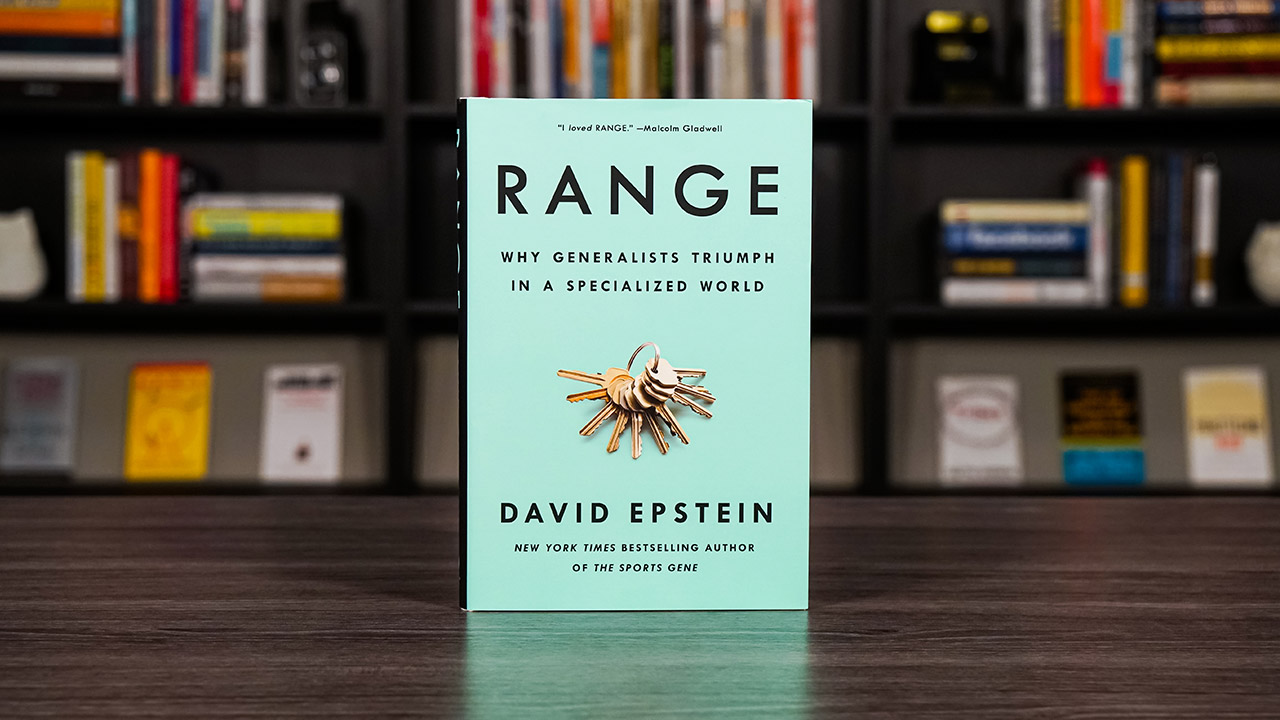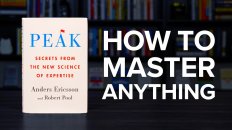Many people believe the key to success is to specialize early. They seek to get a head start in life by identifying a promising opportunity and then focusing all their time and effort on mastering relevant skills. For them, the idea of changing interests, hobbies, or careers is associated with wasting time and effort.
Range by David Epstein is about the many benefits of diverse life experiences. It explains how engaging in a “sampling period” prior to specialization improves match quality, enhances our ability to solve complex problems, and boosts our creativity. It’s a must-read for anyone wanting to unlock greater opportunities for success in life.
So, let’s explore three of my favorite insights from the book.
1. Early Specialization Is Vastly Overrated
As the economy grows in complexity, there is an increasing need for workers with finely tuned skills, knowledge, and expertise. Unfortunately, many people mistakenly assume that the best way to compete in this environment is to specialize as early as possible.
This view seems to be supported by stories of world-class performers, like Tiger Woods, who benefited from early specialization. He committed to a career path at a young age and was highly rewarded for doing so. However, it’s only when we consider the full implications of this strategy that we become aware of the many drawbacks.
Early specialization is built on the assumption that (a) the selected skill will remain valuable in the future, (b) you will be able to sustain the passion needed to outperform others, and (c) technological advancement won’t make your abilities obsolete.
While early specialization can pay off in rare circumstances, it’s not the safe or smart choice many people believe it to be. Instead, it’s a high-risk gamble in which you have very little control over the outcome. And, as with so many gambles, we tend only to hear stories about those who succeeded against the odds.
For every Tiger Woods-like success story, there are many people who wasted years of their life honing a highly specialized skill with little to show for it. They may have developed a strong work ethic along the way, but they lack the diverse life experiences needed to identify and transition to a more promising opportunity.
2. Diverse Life Experiences Are Hugely Beneficial
Many people are in a hurry to figure out where they’re headed in life. As a result, they view time spent exploring unrelated options as wasteful wandering. However, there are many advantages to embracing a lengthy “sampling period” prior to specialization, as well as investing in diverse life experiences. Let’s explore six examples.
1. Identifying Promising Career Possibilities
We cannot identify attractive hobbies or careers by merely reviewing a list of options. Instead, we must get out into the world and participate in a range of activities to discover those that are a fit for us. This is critical because it’s much easier and more enjoyable to take on pursuits that match our passions, interests, and natural tendencies.
Economists use the term “match quality” to describe the degree of fit between the work someone does and who they are—their abilities and proclivities. Students who chose a specialty earlier compiled more skills in preparation for gainful employment. However, studies showed that increased match quality outweighs the advantages of having more skills. Learning stuff was less important than learning about oneself.
Those who engaged in a sampling period were quick to catch up to the productivity of early specializers. Furthermore, those that specialized too early were more likely to switch fields after college or after beginning a career, even though they had more disincentive to switch, having focused on their field for a longer period.
The key then is to specialize later in life by engaging in an extended sampling period to identify the work that is most appealing to you. That way, you’re more likely to invest the time, energy, and effort required to do well in the field.
2. Solving New Or Complex Problems
The methods used to solve problems within specific domains, like performing music, participating in gymnastics, or playing chess, are very different from those needed in other areas. Real-life is rarely so formulaic or rules bound. We don’t always get useful feedback, and the metrics by which we measure success aren’t always clear.
Therefore, it’s critical to distinguish between “kind” and “wicked” learning environments, as defined by psychologist Robin Hogarth. Kind learning environments have patterns that repeat over and over, and feedback is extremely accurate and usually very rapid. If you play a wrong musical note or make a poor chess move, the feedback is clear, and there are well-established ways to improve.
When it comes to wicked learning environments, the rules of the game are often unclear or incomplete, there may or may not be repetitive patterns, and feedback is often delayed, inaccurate, or both. In particularly wicked domains, experience will often reinforce the wrong response. In a famous example, a physician was highly confident in his ability to diagnose typhoid fever. Later it was determined that his method was directly responsible for spreading the disease, which explains his unique ability to yield a positive diagnosis even before the patient displayed symptoms.
The key to overcoming wicked problems is to develop broad life experience. In doing so, we increase our capacity for conceptual reasoning, connecting ideas, and working across contexts. Thus, when we face a difficult challenge, we’re able to combine ideas and insights from unrelated domains to come up with novel solutions.
As human beings, our most significant advantage over artificial intelligence is the ability to integrate broad knowledge. The best-paying jobs of the future are likely to be given to those who can use this ability to solve unexpected challenges more effectively.
3. Transferring Knowledge Across Domains
One of the most common problems in education is the inability to transfer knowledge from one context to another. People often struggle to take something they learned in one context, perhaps in a classroom, and apply it in another context, like the real world. As a result, it’s common for people to master a skill in one domain yet utterly fail to appreciate how it can be applied to other situations.
The problem of transfer tends to be greatest when our knowledge is highly specialized or otherwise limited. Thus, one way to combat the issue of transfer is to have a broader set of life experiences on which to develop mental models for common patterns. Doing so expands our ability to reason by analogy and think more abstractly, which helps us use knowledge across unrelated contexts.
In short, breadth of training predicts breadth of transfer. The more contexts in which something is learned or reinforced, the more the learner creates abstract models, and the less they rely on any particular example or context to apply what they’ve learned.
4. Doing More Creative And Novel Work
Much of what we’ve covered in regards to problem-solving and knowledge transfer also applies to creativity. That’s because much of what people describe as creativity is simply the mating of ideas that were previously considered unrelated. By combining insights or ideas from one context to another, we can produce more creative results.
Studies show that technological inventors increased the creativity of their work by accumulating experience in different domains. They did so by proactively sacrificing a bit of depth in favor of increased breadth. There was a nearly identical finding in a study of artistic creators. Meanwhile, those who did not make a creative contribution to their field lacked aesthetic interests outside their narrow area.
5. Breaking Through Skill Ceilings
There is only so much that can be gained by drilling or applying the same skills over and over again. However, diverse or unrelated experiences can cause us to think differently by bringing a fresh perspective to an otherwise repetitive process. As a result, we can break through skill ceilings and improve our abilities in unexpected ways.
For example, an amateur ice hockey player who plays pool might consider creative ways to pass the puck off the end boards. Alternatively, a hockey player with soccer experience may develop creative ways to control the puck with their skates. In either case, focusing exclusively on hockey-related drills may not uncover these unexpected opportunities unless or until professional players discover them through a similar process and model them as modern advancements in the sport.
Just as creativity is based on the mating of ideas, our overall skill can be expanded by borrowing techniques, concepts, and strategies from other disciplines. Thus, if you hit a perceived skill ceiling, it’s often helpful to mix things up by broadening your horizons.
6. Increasing Career Flexibility And Adaptability
Long gone are the days when people would choose a single career and stick with it for the duration of their working life. Today people switch roles for various reasons, including changes in the industry, changes in their interests, or even a shift in available opportunities. Thus, it’s helpful to be prepared for this possibility.
One of the most significant benefits of broad experience is the flexibility it provides. By avoiding the urge to specialize early, you have the opportunity to try many things and get comfortable in a wide variety of situations. Even when you later specialize in a promising career, you still retain the option to change things up if needed.
This is important because there is no way to predict which careers will remain relevant for years or even decades to come. By specializing late, you gather more information on which to base your career choice, and, in many cases, you’ll discover compelling alternatives. If your first pick doesn’t work out, you can shift your focus to another role that seems like an equally strong fit for you.
3. It’s Never Too Late To Pursue Something New
When asked to sum up the message of the book in a single sentence of advice, the author said, “Don’t feel behind.” It’s never too late to try something new. So long as you’re taking on interesting life challenges, you will continue to upgrade your toolkit, bolster your creativity, and make new connections.
The fact is, we aren’t all headed towards the same finish line. Furthermore, we don’t even have a clear sense of our own “finish line” at any given moment. Thus, we cannot know which experiences will be most relevant to future opportunities or challenges. With this in mind, it’s beneficial to continue to broaden our horizons and try new things.
The book contains countless examples of how late specialists often did as well, or even better, than early specialists in the same field. By engaging in a sampling period prior to specialization, we can achieve higher match quality, bolster our problem-solving abilities, enhance our creativity, and improve the way we transfer knowledge from one domain to another. All of this gives us a competitive advantage that is difficult or even impossible to emulate through early specialization alone.
Avoid the trap of treating unrelated or disconnected experiences as a waste. Instead, embrace every step of the journey as a valuable asset. You never know which insight or experience will play a critical role in your future success.
Beyond The Range Book Summary

This summary of Range by David Epstein is just a preview of the many insights and ideas covered in the book. If you’re interested in learning more, I recommend that you pickup a copy from Amazon, Apple Books, or your favorite local bookstore.
Are you interested in discovering another great book? Consider exploring the best self-help books, the best productivity books, or the 50 best business books.
Do You Have A Question Or Comment?
Please visit the Range book summary video on YouTube to share your thoughts in the comment section.


